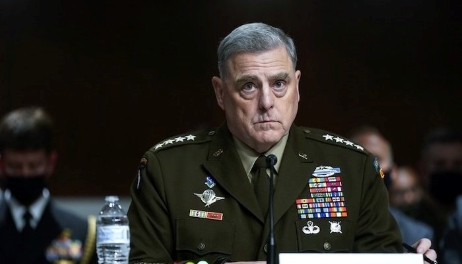Gen. Milley: ‘I Don’t Know the Exact Number of Americans That Were Left Behind

ANOTHER DEMOCRAT LIAR!
By
Milley took his disputes with Trump public when no lives were at stake and kept his private with Biden when lives were at stake.
We have court martialed men for less, but there’s no accountability at the top.
At the Congressional hearing on Biden’s disastrous Afghanistan disaster, Gen. Milley showed the presence of mind and command of detail that he was famous for.
“I’ll be candid, I don’t know the exact number of Americans that were left behind, because the starting number was never clear,” Milley admitted. “Same is true of at-risk Afghans, SIVs the commandos, other Afghans that served with us — those numbers varied so widely that they were quite inaccurate.”
The upshot of the testimony from Milley and Gen. McKenzie is that the whole thing was a mess because of the State Department which refused to evacuate until the last minute.
Gen. Kenneth “Frank” McKenzie, who was the top U.S. general in the Middle East during the withdrawal, also testified beside Milley on Tuesday.
He echoed Milley’s comments on what he conceded was a late call to evacuate, placing blame on the State Department, which holds the authority to initiate such operations.
“I believe that the events of mid and late August 2021 were the direct result of delaying the initiation of the NEO for several months,” McKenzie said. “In fact, until we were in extremists, and the Taliban had overrun the country — as you are aware of, the decision to begin a NEO rests with the Department of State, not the Department of Defense. Despite this, we had begun positioning forces in the region as early as nine July, but we could do nothing.”
On Tuesday, McKenzie, who retired in 2022, reaffirmed that he effectively relayed his advice to the president: “I participated in meetings at the very highest level where I expressed the opinion I just stated to you, and it was heard,” he said during an exchange on the matter.
We’ve heard all this before. What has been less emphasized, but is equally obvious, is that the State Department got its way because Biden sided and still sides with the State Department.
On May 8, 2021, during a rehearsal for the evacuation operation with Sullivan, Defense Secretary Lloyd Austin, Joint Chiefs of Staff Chairman Gen. Mark Milley and others, the Pentagon and the State Department feuded over whether they had to close the U.S. embassy in Kabul as troops withdrew.
The Defense Department argued that the country would be too dangerous to have the embassy try to do business as usual.
Brian McKeon, the deputy secretary of state for management and resources, jumped in and said their diplomats would be fine: “We at the State Department have a much higher risk tolerance than you guys,” he told the uniformed personnel.
Ward writes that “Milley nearly jumped out of his chair, but restrained himself from shouting how he and many serving in the armed forces had lost friends in war. Austin showed no signs of anger, but he later told colleagues that he was offended by McKeon’s remark.”
After Afghanistan, “no one offered to resign, in large part because the president didn’t believe anyone had made a mistake. Ending the war was always going to be messy,” Politico’s Alexander Ward writes in “The Internationalists: The Fight to Restore Foreign Policy After Trump.”
“Biden told his top aides, [National Security Advisor Jake] Sullivan included, that he stood by them and they had done their best during a tough situation.”
“There wasn’t even a real possibility of a shake-up,” a White House official told Ward.
Now consider how Gen. Milley had made his disagreements with Trump public when no lives were at stake, but kept his disagreements with Biden private when lives were at stake.
But Milley’s career depended on a break with Trump and on keeping quiet about Biden.
















